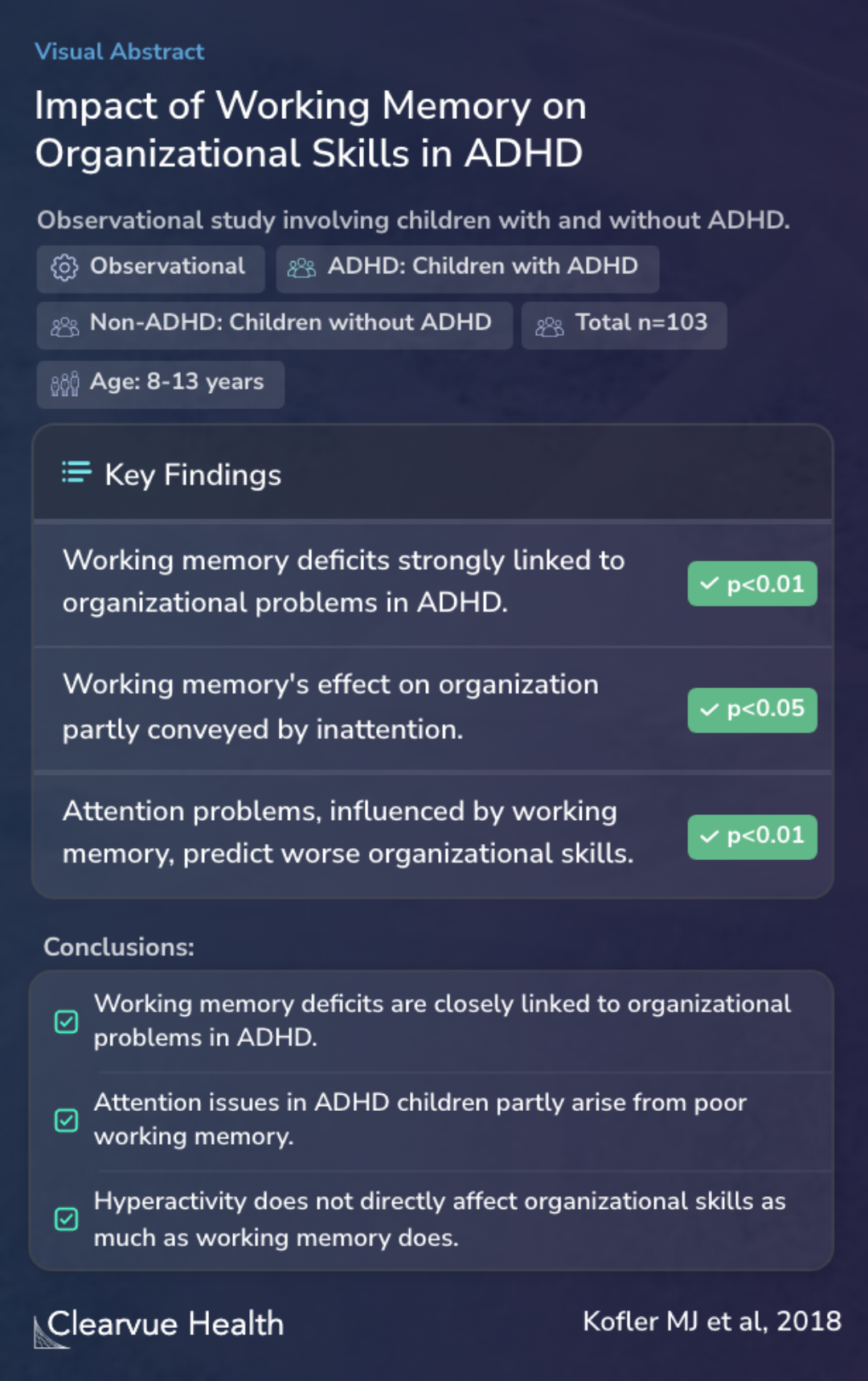Working memory and organizational skills problems in ADHD
Impact of Working Memory on Organizational Skills in ADHD
Kofler MJ, Sarver DE, Harmon SL, Moltisanti A, Aduen PA, Soto EF, Ferretti N

Objectives
The study embarked on an exploration to understand the role of working memory in the organizational difficulties often encountered by children with ADHD. This investigation was driven by the hypothesis that working memory, a crucial cognitive function, plays a significant part in these challenges.
This study tested model-driven predictions regarding working memory's role in the organizational problems associated with ADHD.
Methods
The authors of the study focused on children aged 8-13, both with and without ADHD. They assessed these children using various tasks to measure their working memory capabilities. Additionally, parents and teachers provided insights through a standardized scale that evaluates organizational problems. This comprehensive approach aimed to capture a full picture of the impact of working memory on daily functioning in these children.
Children aged 8-13 (M = 10.33, SD = 1.42) with and without ADHD (N = 103; 39 girls; 73% Caucasian/Non-Hispanic) were assessed on multiple, counterbalanced working memory tasks. Parents and teachers completed norm-referenced measures of organizational problems (Children's Organizational S...
Results
The results of this study were quite revealing. Children with ADHD showed significant deficits in working memory, with a marked effect size (d = 1.24). These deficits were strongly connected to greater organizational problems, as reported by both parents and teachers. Furthermore, about 38%-57% of the impact of working memory on organizational issues was mediated through inattentive behavior. Interestingly, while attention problems were found to predict worse organizational skills, hyperactivity seemed to have a less direct influence on these skills.
Results confirmed large magnitude working memory deficits (d = 1.24) and organizational problems in ADHD (d = 0.85). Bias-corrected, bootstrapped conditional effects models linked impaired working memory with greater parent- and teacher-reported inattention, hyperactivity/impulsivity, an...
Conclusions
In conclusion, the study paints a detailed picture of the struggles faced by children with ADHD. Their organizational challenges are largely tied to how well they can manage working memory tasks. These difficulties manifest in various settings and are not solely a product of inattention, but also are influenced by it. This understanding could be pivotal in developing more targeted interventions for children with ADHD, focusing on enhancing working memory and addressing attention-related difficulties.
Children with ADHD exhibit multisetting, broad-based organizational impairment. These impaired organizational skills are attributable in part to performance deficits secondary to working memory dysfunction, both directly and indirectly via working memory's role in regulating attention. I...
Key Takeaways
Context
In the broader context of ADHD research, this study adds a significant piece to the puzzle. Previous research by Roth et al. (2004) highlighted the link between ADHD, working memory, and learning challenges, suggesting that anxiety might play a role in these difficulties.
Meanwhile, a 2017 study by Bikic et al. demonstrated the effectiveness of Organizational Skills Training (OST) in improving not just organizational skills, but also attention and academic performance in children with ADHD. These findings, when viewed alongside the current study, emphasize the multifaceted nature of ADHD and the importance of addressing various cognitive and behavioral aspects for effective management.